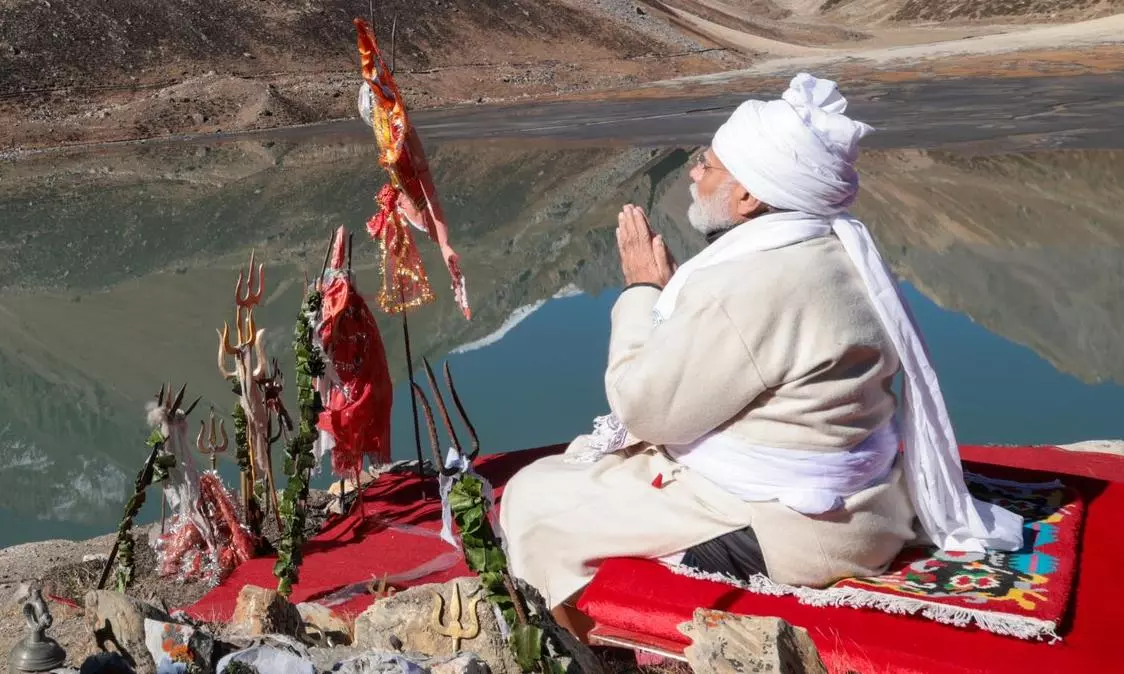
- Home
- India
- World
- Premium
- THE FEDERAL SPECIAL
- Analysis
- States
- Perspective
- Videos
- Sports
- Education
- Entertainment
- Elections
- Features
- Health
- Business
- Series
- In memoriam: Sheikh Mujibur Rahman
- Bishnoi's Men
- NEET TANGLE
- Economy Series
- Earth Day
- Kashmir’s Frozen Turbulence
- India@75
- The legend of Ramjanmabhoomi
- Liberalisation@30
- How to tame a dragon
- Celebrating biodiversity
- Farm Matters
- 50 days of solitude
- Bringing Migrants Home
- Budget 2020
- Jharkhand Votes
- The Federal Investigates
- The Federal Impact
- Vanishing Sand
- Gandhi @ 150
- Andhra Today
- Field report
- Operation Gulmarg
- Pandemic @1 Mn in India
- The Federal Year-End
- The Zero Year
- Science
- Brand studio
- Newsletter
- Elections 2024
- Events
- Home
- IndiaIndia
- World
- Analysis
- StatesStates
- PerspectivePerspective
- VideosVideos
- Sports
- Education
- Entertainment
- ElectionsElections
- Features
- Health
- BusinessBusiness
- Premium
- Loading...
Premium - Events

For a leader who showcases advanced technological advancement, asking people to seek divine assistance during tough situations seems duplicitous
Success has many fathers. The essence of this adage is that a collective effort always lies at the root of triumphs or accomplishments.
Besides the joint endeavour of several people or agencies with diverse skills and backgrounds, some ‘Ds’ are also listed in this enterprise: Desire, Discipline, Dedication and Determination. In the aftermath of the much-welcome rescue of 41 construction workers trapped inside the under-construction Silkyara tunnel, a part of the Char Dham Pariyojana (project), in Uttarkashi district, Uttarakhand, another ‘D’ was added: Divine Intervention.
Widely circulated as the ultimate truth in contemporary India – a WhatsApp forward – it was only a conscious effort that revealed that the sequence of aforementioned five words (including the paired duo) beginning with the Alphabet ‘D’, was actually first attributed to Vijay Amritraj.
In India, rationality, scientific attitude, differentiation and secularism co-exists with blind-faith in religion, superstition, determination and bigotry. It is also commonplace for people to pick and choose from these two divergent sets of characteristics. In such cases however, these individuals usually end up as walking-talking lookalikes of Molotov cocktails.
More often than not, the unreasonable and prejudice in the mind, mute belief in diversity and open-mindedness, and unleashes the animal instinct within large sections of citizens.
Invoking divine power
From the first day of the tunnel crisis, especially after the progress in extricating trapped workers became TRP-generating, headline news on TV channels, it was amply evident that this would require adroit and dedicated hands working in unison with a combination of the latest machines and devices alongside traditional methods.
There also was no manual to follow. It became apparent that the team would have to lean back on the good-old hit and trial method. Likewise, those strategising the mission would have to provide scope for improvisation by the hands extracting fallen debris, and finding a way to reach the place of confinement.
The first evidence of invoking the divine power was when some days before the crisis ended, residents of nearby villages installed the idol of local deity, Baba Baukh Naag, near the accident site and began offering obeisance. Soon, people began gathering near the makeshift temple, a description used more often than not in recent decades. These structures, especially the one in Ayodhya, played a critical role in hurtling India towards the state it is in now.
Nothing but a miracle
Less than a day after the nation collectively heaved a sigh of relief, Arnold Dix, theAustralian tunneling expert, said the successful rescue of the trapped workers was all but a miracle. He even went to the temporary temple of the local divine being to express a personal thanks and gratitude.
The word miracle is often used loosely. The Oxford Reference website, which brings together almost two million digitized entries across Oxford University Press’s Dictionaries, Companions and Encyclopedias, lists the meaning of the word precisely: “A surprising and welcome event that is not explicable by natural or scientific laws and is therefore considered to be the work of a divine agency.” It further delves into the word’s etymology.
It is one thing for local villagers, workers who were trapped and their families, none of who have great power and resources in their hands, to get into the khuda ka shukr hai ('thank god') mode. But, is it natural for a much-vaunted expert who ”prides himself on finding technical and regulatory solutions to complex, novel and mission critical challenges in underground spaces,” to disregard the final flourish of specially summoned rat-hole miners reaching the trapped workers and rescuing them?
Dix on divine intervention
By expressing gratefulness towards the hand of divinity, did not Dix fail in acknowledging the skills, bravery and determination of these miners whose craft was outlawed in 2014? After all, Munna Qureshi and his team accomplished the objective whereas machines with far greater capacity failed.
Given his transitory role in India (unless he is inducted in some capacity to evaluate the future path of the project), Dix’s deviation from the scientific and technological path he pursues professionally, can be excused for being an expression of relief and an elaborate gesture to the skies.
Moreover, his comments to a journalist from The Sydney Morning Herald are not aimed at sensationalising the sequence of events. He said that the final moments of the great rescue act brought, courtesy TV channels, “1.4 billion people in one room, celebrating together” when the workers were extricated one after another.
Dix’s response can be attributed to being overwhelmed with emotions at seeing barely a dozen rescuers taking turns to dig “through rocks and debris using hand-held tools after the machine they had been using broke down.”
But, can a similar relief be granted to Prime Minister Narendra Modi? Can it be ignored that he called upon people, during religio-political engagements in Hyderabad, in the course of an electoral campaign, to pray for the trapped workers?
Not the first time
For a premier who showcases technological advancement in his tenure, from mobile phones to aeroplanes and railway coaches and even vehicles that can pierce the skies, asking people to seek divine assistance for the rescue act was certainly duplicitous.
This was not the first time that he invoked divine powers to overcome a crisis that required a rational and scientific process. Previously, Modi did not utilise the outbreak of the COVID-19 pandemic to inculcate scientific temper among people. This would have enabled them to overcome similar challenges with the assistance of better comprehension of health issues and how diseases spread.
From the onset of the COVID-19 pandemic in India, which effected the entire population, to the latest crisis that almost cost a small group of people their lives, Modi has made no effort to bolster rationality and a scientific perspective among citizens.
In the initial days of the pandemic, when Modi dramatically and at very short notice, declared lockdown in the country, he made absolutely no effort to make citizens shed rampant superstition and embrace the spirit of scientific enquiry.
Readers would recall that in March 2020, when Modi called for a ‘Janata Curfew’, the people ended their stay indoors by beating thali or plates and clanging of bells. It was done at the call of none else but the Prime Minister. Modi was found wanting on several other occasions, including getting people to initially overcoming their fear of the vaccine.
A satirist sketch of 21st century
Modi’s appeal to people for prayers to escort the trapped workers to safety in fact, served a reminder to a wicked column in the mid-1980s by a leading satirist in a Hindi magazine. The piece was written when the air was thick with Rajiv Gandhi’s call for Indians to prepare for the 21st century.
Jokes were rampant in response to his call, which was figurative in nature, but was perceived literally. The article imagined a newspaper office a decade and a half later, during the turn of the century, where the no-nonsense bureau chief directed a laidback reporter to file a story on how people were preparing for the 21st century.
Weeks elapsed and with the end of the century in sight, and no report forthcoming, the boss cracked the whip and declared that by the end of day, either the story or the reporter’s resignation must be on the table.
The galvanised young reporter darted from one colony to the other, but no one spared time; everyone claimed to be preoccupied with preparations and packing!
The reporter trudged back to office drafting his resignation in the mind when he saw someone beneath a large tree with little but a small briefcase lookalike.
“Are you not going to the 21st century?”
“Of course, I am.”
“Is your packing done?”
“It’s all done,” the man responded and pointed to the not so under-sized briefcase.
“What’s in that?”
“Why, a computer and Hanuman Chalisa,” came the insolent response.
The reporter was perplexed at this: “What will you do with these two?”
“Will do all my work on the computer, and if it gets faulty, I will chant the Hanuman Chalisa to repair it,” said the well-prepared man.
Matters of faith
Almost four decades later, India enacts that satire the moment any challenge confronts us: we use the latest of machines to tackle the biggest crises, even while the Prime Minister implores on people to pray for the entrapped.
He can always say that being elected by the people, it is his duty to follow them. And, did they not raise a do-it-yourself temple to Baba Baukh Naag?
India and Indians of this moment shall thereby use the latest gadgets from mobile phones to space ships and aim to put humans in space, and the moon or even the Prime Minister at 73 in space.
But if any of these missions fail, there is always the path paved by matters of faith, a coinage that has a history spread over three-and-a-half decades.
Little change now exists between the India as imagined by a satirist and the real one today. Can this transition not be called real progress?
(The Federal seeks to present views and opinions from all sides of the spectrum. The information, ideas or opinions in the articles are of the author and do not necessarily reflect the views of The Federal)


